Why do people get bad breath?
Bad breath, scientifically known as halitosis, can be caused by many factors, some obvious to the naked eye and others hidden inside the body. Often several factors will combine and elevate the breath to a point where the odour becomes noticeable to others. When someone suffers daily from bad breath over an extended period of time this is considered to be a case of chronic halitosis. This chronic stage will often require the intervention of a trained medical professional to treat the cause and provide solutions to prevent the return of this frustrating problem. Patients that knowingly suffer from bad breath express feelings of embarrassment and a lack of self-esteem and confidence they say impacts the quality of their daily lives. However, there are a vast majority of people who don't even realise they have bad breath and often find out in a very social and confrontational way, causing more damage to one's confidence to talk to others.
Signs that you may have bad breath
- People avoid being close when you speak
- You have a metallic or bitter taste in your mouth
- You have a postnasal drip or sinus congestion condition
- You have a heavy coating on your tongue
- You have not seen a dentist in over 12 months
- You need dental work or have failing dentistry
- You have impacted wisdom teeth
- Your gums bleed when you brush or floss
- You have a high protein diet
- You suffer from reflux
- You have a dry mouth
- You don't drink enough water
- You don't have good oral home care
In most cases, the main causes of bad breath are the presence of certain bacteria in your mouth and throat that produce an unpleasant gas. These types of bacteria feed on degrading food and the build-up of mucous in the mouth. As the bacteria grows then produce gases called volatile sulphur compounds (VSCs). When the bacteria levels reach a certain threshold this gas becomes noticeable to others as bad breath. In 10% of bad breath cases, the origin is not oral and can be due to more serious underlying medical problems however, this is rarely the case. The good news is once you identify which bacteria is causing the odour it can be safely and easily removed and a simple at-home management plan can be implemented to prevent it from returning.

What can cause bad breath?
- Poor dental hygiene at home
- Not visiting the dentist every six months for a check-up and clean
- Failing existing dentistry
- Heavy coating on the tongue
- Infections and rot in teeth and gums
- Dry mouth (xerostomia)
- Sinus condition
- High protein diet
- Dairy products
- Respiratory tract infections
- Not drinking enough water
- Smoking and recreational drugs
- Alcohol and caffeine
- Systemic illnesses (diabetes, liver, heart and kidney disease, reflux)
Have you heard of Halitophobia?
'The fear of having bad breath.'
Our breath analysis team often consult with people that have a perception of having bad breath, however, it is not detected by oral-health-care professionals, friends, family or even extremely sensitive gas chromatography equipment such as the Sunshine Coast Fresh Breath Clinic’s OralChroma machine. This is referred to as “pseudo-halitosis” or “halitophobia” which refers to the fear of having bad breath. This condition is often seen in patients who have been cured of bad breath yet the mental scar from having faced the embarrassing situation for so many years is still with them. When this becomes the diagnosis, seeking counsel from a professional that can assist in regaining confidence in social situations and removing this internal fear is recommended.
